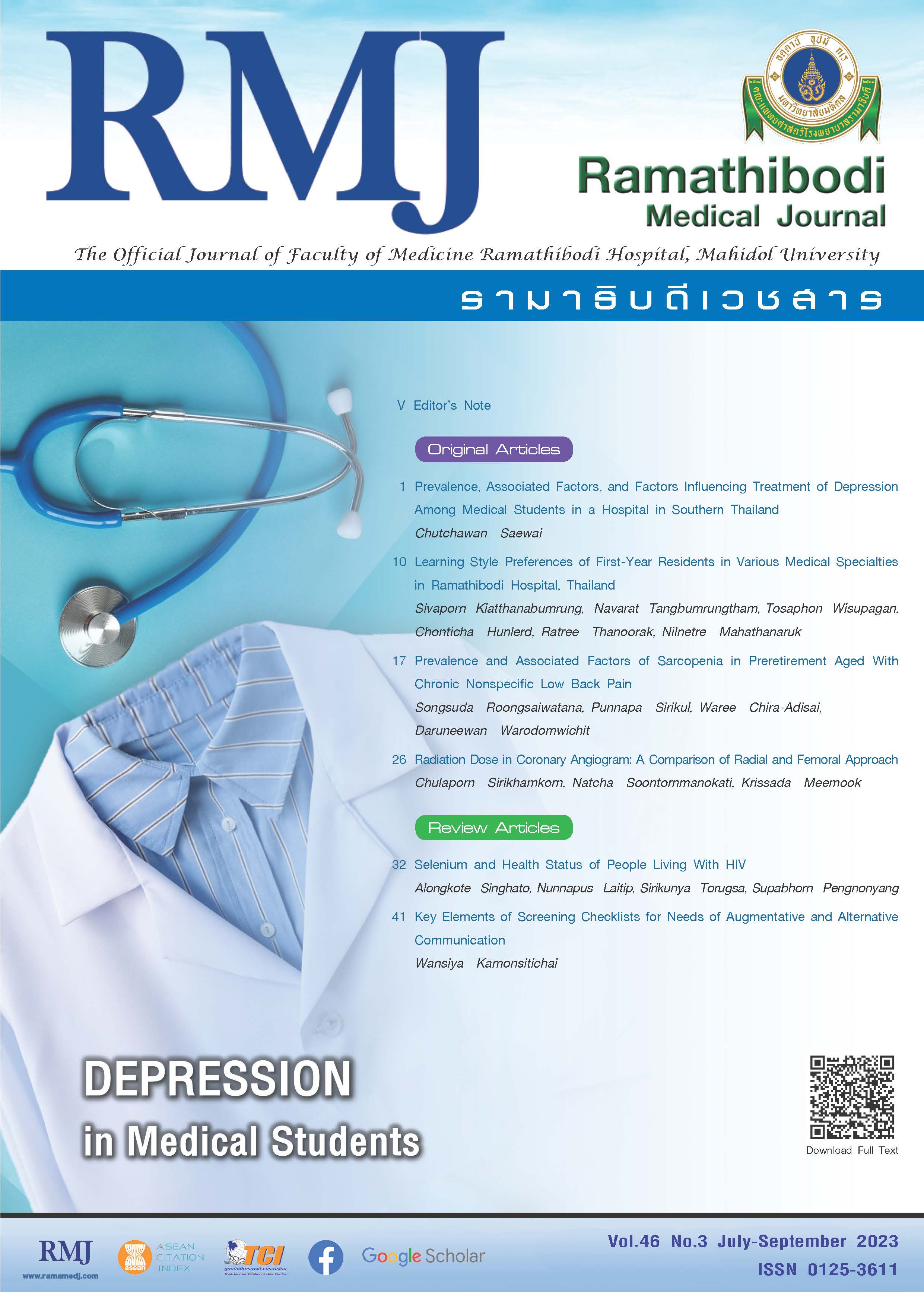Prevalence and Associated Factors of Sarcopenia in Preretirement Aged With Chronic Nonspecific Low Back Pain
DOI:
https://doi.org/10.33165/rmj.2023.46.3.264121Keywords:
Sarcopenia, Chronic low back pain, Preretirement agedAbstract
Background: Sarcopenia stands as a prominent health concern, exhibiting a notable correlation with chronic lower back pain among the elderly population, with an observed upward trajectory of both conditions within the preretirement age group.
Objective: To examine the prevalence of sarcopenia among individuals in the preretirement age group experiencing chronic nonspecific low back pain, and identify any associated factors.
Methods: This descriptive cross-sectional study included 164 participants, aged 50 to 59 years, from the Department of Rehabilitation Medicine, Faculty of Medicine Ramathibodi Hospital, Mahidol University. Patient data encompassing demographics, physical activity (International Physical Activity Questionnaires, IPAQ), and quality of life (European Quality of Life 5-Dimension 5-Level, EQ-5D-5L) were collected. Sarcopenia criteria, following the Consensus of the Asian Working Group of Sarcopenia (AWGS) 2014, were evaluated through bioelectrical impedance analysis, handgrip dynamometry, and/or the 6-meter walk test. Participants with chronic low back pain underwent assessments of pain severity and functionality.
Results: Of 164 participants (mean [SD] age, 55.1 [2.6] years; mean [SD] body mass index, 24.7 [4.3] kg/m2), IPAQ responses indicated a range from low to moderate activity levels. The health-related quality of life score (median [range]) from EQ-5D-5L assessments stood at 0.94 [0.34 - 1.00]. Sarcopenia was detected in 10 out of 58 subjects (17.2%) with chronic low back pain, and in 6 out of 106 normal subjects (5.7%).
Conclusions: The prevalence of sarcopenia among individuals within the preretirement age group experiencing chronic low back pain was notably high when compared to non chronic low back pain cases, without associated factors.
References
Limpawattana P, Kotruchin P, Pongchaiyakul C. Sarcopenia in Asia. Osteoporos Sarcopenia. 2015;1(2):92-97. doi:10.1016/j.afos.2015.10.001
Chen LK, Liu LK, Woo J, et al. Sarcopenia in Asia: consensus report of the Asian Working Group for Sarcopenia. J Am Med Dir Assoc. 2014;15(2):95-101. doi:10.1016/j.jamda.2013.11.025
Kelley GA, Kelley KS. Is sarcopenia associated with an increased risk of all-cause mortality and functional disability? Exp Gerontol. 2017;96:100-103. doi:10.1016/j.exger.2017.06.008
Pongchaiyakul C, Limpawattana P, Kotruchin P, Rajatanavin R. Prevalence of sarcopenia and associated factors among Thai population. J Bone Miner Metab. 2013;31(3):346-350. doi:10.1007/s00774-013-0422-4
Khongsri N, Tongsuntud S, Limampai P, Kuptniratsaikul V. The prevalence of sarcopenia and related factors in a community-dwelling elders Thai population. Osteoporos Sarcopenia. 2016;2(2):110-115. doi:10.1016/j.afos.2016.05.001
Lewis R, Gómez Álvarez CB, Rayman M, Lanham-New S, Woolf A, Mobasheri A. Strategies for optimising musculoskeletal health in the 21st century. BMC Musculoskelet Disord. 2019;20(1):164. doi:10.1186/s12891-019-2510-7
Woolf AD, Pfleger B. Burden of major musculoskeletal conditions. Bull World Health Organ. 2003;81(9):646-656.
Lin CC, McAuley JH, Macedo L, Barnett DC, Smeets RJ, Verbunt JA. Relationship between physical activity and disability in low back pain: a systematic review and meta-analysis. Pain. 2011;152(3):607-613. doi:10.1016/j.pain.2010.11.034
Meucci RD, Fassa AG, Faria NM. Prevalence of chronic low back pain: systematic review. Rev Saude Publica. 2015;49:1. doi:10.1590/S0034-8910.2015049005874
Takahashi A, Kitamura K, Watanabe Y, et al. Epidemiological profiles of chronic low back and knee pain in middle-aged and elderly Japanese from the Murakami cohort. J Pain Res. 2018;11:3161-3169. doi:10.2147/JPR.S184746
Shmagel A, Foley R, Ibrahim H. Epidemiology of chronic low back pain in US adults: data from the 2009-2010 National Health and Nutrition Examination Survey. Arthritis Care Res (Hoboken). 2016;68(11):1688-1694. doi:10.1002/acr.22890
Yiengprugsawan V, Hoy D, Buchbinder R, Bain C, Seubsman SA, Sleigh AC. Low back pain and limitations of daily living in Asia: longitudinal findings in the Thai cohort study. BMC Musculoskelet Disord. 2017;18(1):19. doi:10.1186/s12891-016-1380-5
Park S, Bang H, master CL, Chun SW, Kim K, Chung SG. Poster 176 relationships between chronic low back pain and sarcopenia in the elderly. PM&R. 2015;7(9S):S149-S150. doi:10.1016/j.pmrj.2015.06.214
Park S, Kim HJ, Ko BG, et al. The prevalence and impact of sarcopenia on degenerative lumbar spinal stenosis. Bone Joint J. 2016;98-B(8):1093-1098. doi:10.1302/0301-620X.98B8.37623
Sakai Y, Matsui H, Ito S, et al. Sarcopenia in elderly patients with chronic low back pain. Osteoporos Sarcopenia. 2017;3(4):195-200. doi:10.1016/j.afos.2017.09.001
Rattanawiwatpong P, Khunphasee A, Pongurgsorn C, Intarakamhang P. Validity and reliability of the Thai version of short format international physical activity questionnaire (IPAQ). J Thai Rehabil. 2006;16(3):147-160.
Pattanaphesaj J. Health-related quality of life measure (EQ-5D-5L): measurement property testing and its preference-based score in Thai population. Dissertation. Mahidol University; 2014.
Wang H, Hai S, Cao L, Zhou J, Liu P, Dong BR. Estimation of prevalence of sarcopenia by using a new bioelectrical impedance analysis in Chinese community-dwelling elderly people. BMC Geriatr. 2016;16(1):216. doi:10.1186/s12877-016-0386-z
Sousa-Santos AR, Amaral TF. Differences in handgrip strength protocols to identify sarcopenia and frailty - a systematic review. BMC Geriatr. 2017;17(1):238. doi:10.1186/s12877-017-0625-y
Cerri AP, Bellelli G, Mazzone A, et al. Sarcopenia and malnutrition in acutely ill hospitalized elderly: prevalence and outcomes. Clin Nutr. 2015;34(4):745-751. doi:10.1016/j.clnu.2014.08.015
Sanjaroensuttikul N. The Oswestry low back pain disability questionnaire (version 1.0) Thai version. J Med Assoc Thai. 2007;90(7):1417-1422.
Parkkola R, Rytökoski U, Kormano M. Magnetic resonance imaging of the discs and trunk muscles in patients with chronic low back pain and healthy control subjects. Spine (Phila Pa 1976). 1993;18(7):830-836. doi:10.1097/00007632-199306000-00004
McLester CN, Nickerson BS, Kliszczewicz BM, McLester JR. Reliability and agreement of various inbody body composition analyzers as compared to dual-energy x-ray absorptiometry in healthy men and women. J Clin Densitom. 2020;23(3):443-450. doi:10.1016/j.jocd.2018.10.008
Fujimoto K, Inage K, Eguchi Y, et al. Use of bioelectrical impedance analysis for the measurement of appendicular skeletal muscle mass/whole fat mass and its relevance in assessing osteoporosis among patients with low back pain: a comparative analysis using dual x-ray absorptiometry. Asian Spine J. 2018;12(5):839-845. doi:10.31616/asj.2018.12.5.839
Cherin P, Voronska E, Fraoucene N, de Jaeger C. Prevalence of sarcopenia among healthy ambulatory subjects: the sarcopenia begins from 45 years. Aging Clin Exp Res. 2014;26(2):137-146. doi:10.1007/s40520-013-0132-8
Soer R, Reneman MF, Speijer BL, Coppes MH, Vroomen PC. Clinimetric properties of the EuroQol-5D in patients with chronic low back pain. Spine J. 2012;12(11):1035-1039. doi:10.1016/j.spinee.2012.10.03
Downloads
Published
How to Cite
Issue
Section
License
Copyright (c) 2023 Ramathibodi Medical Journal

This work is licensed under a Creative Commons Attribution-NonCommercial-NoDerivatives 4.0 International License.

















